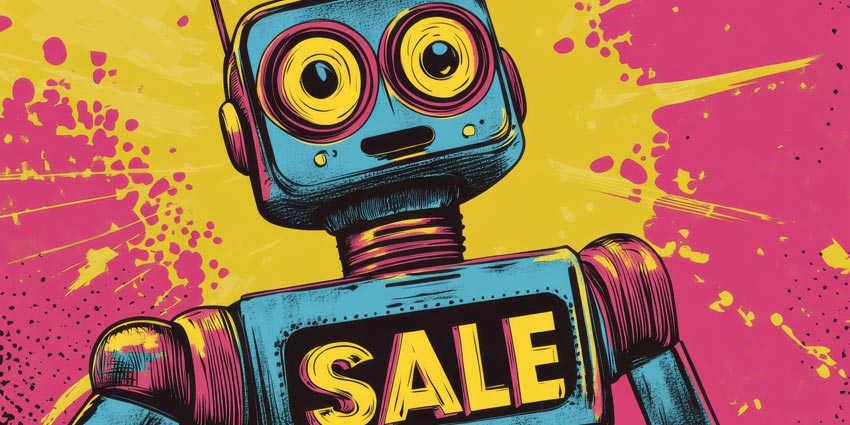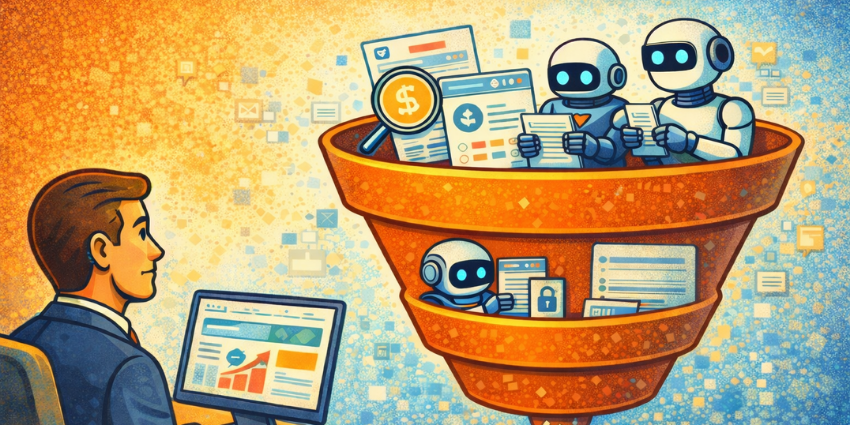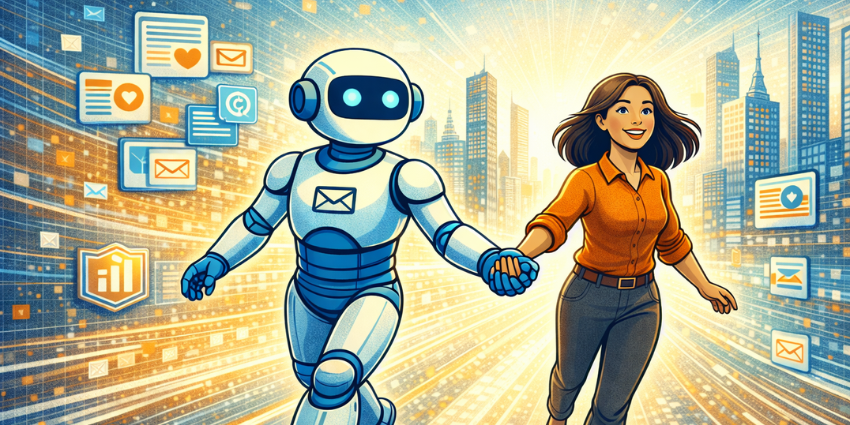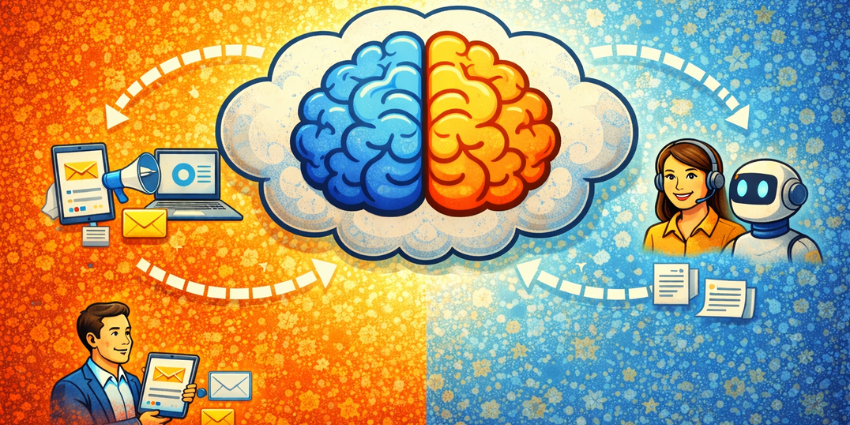Departments across the organization are discovering more and more use cases for generative AI (GenAI).
Sales is no exception, isolating many applications to better manage their time, find qualified leads, handle objections, and more.
From customer research through to post-purchase activities, GenAI is reimaging the sales process.
That’s critical, as many sales teams have long struggled to operate with speed, precision, and efficiency as customer preferences continue to shift.
In 2023, McKinsey predicted that GenAI tools could increase productivity among sales teams by three to five percent, adding trillions of dollars in value to the global economy.
Let’s explore some of the use cases helping sales teams move the needle.
1. Admin Automation
Example: Salesforce Einstein (and Agentforce Agents)
Sales professionals often get stuck doing everything except selling. There’s a lot of admin work that can consume a team’s energy and productivity.
Generative AI in sales can tackle this head-on by automating various tedious tasks. AI tools like Salesforce Einstein can automatically update CRM records, summarize call notes, extract data from emails and messages, and more in real-time.
Some businesses are now taking this further with agentic AI, creating custom agents that automate entire workflows.
Indeed, AI agents can build tools that can craft pitches, recommend discounts or deals, and even design sales strategies with relevant resources for specific teams.
2. Personalized Customer Comms.
Example: Gong Engage
71 percent of buyers now expect personalized experiences, as per McKinsey. Companies that deliver earn 40 percent more revenue than those that don’t.
However, keeping every message, pitch, and proposal tailored to each prospect is difficult at scale.
Generative AI can help personalize everything from cold emails to full presentations, taking customer context to tailot the response.
Gong Engage is a great example of a tool that can compose custom content for customers based on prior communication, buying stage, and tone preferences.
The platform can even recommend key tasks to specific team members, advising them on when to follow up with customers and on which channels.
3. AI-Powered Prospecting
Example: HubSpot Breeze Copilot
Gartner predicts that by 2027, 97 percent of sales workflows will begin with AI. For many companies, that means optimizing prospecting and account research tasks.
Generative AI in sales platforms can help companies sift through massive datasets fast, combining intent data, firmographics, buying signals, and more to identify valuable targets.
For instance, HubSpot offers capabilities within Sales Hub to research prospects, isolate decision-makers, score leads, and create personalized outreach strategies.
Companies like Zoom are experimenting with similar solutions, like prospecting agents for Zoom’s Revenue Accelerator platform.
4. Sales Content Creation
Example: Jasper.AI
From auto-generating sales decks to email templates, content creation has always been a time sink for sales reps. Customizing materials for each prospect takes even more effort.
AI writing platforms, like Jasper, Copy.AI, and Writer, help sales and marketing teams develop high-quality content fast. These tools can generate email copy, blog introductions, case studies, cold call scripts, and sales battle cards.
Some AI assistants, like the Microsoft 365 Sales Copilot, can also draw on CRM data to personalize each piece of content.
Additionally, the Jasper platform empowers companies to upload examples of their brand’s tone of voice for improved content consistency.
5. Real-Time Sales Coaching
Example: Dialpad AI Sales Coach
Sales coaching has always been limited by time. Managers can’t join every call. Employees spend weeks waiting for feedback, which means growth slows.
Generative AI assistants and copilots are changing that, with real-time coaching and performance feedback.
Dialpad’s GenAI sales coach is an excellent example, listening to live sales calls, analyzing dialogue, detecting sentiment, and prompting reps with suggestions through the call.
The solution can even advise reps on adjusting their tone of voice in real time to ensure they’re showing emotional intelligence, empathy, and professionalism.
6. Simulated Sales Training
Example: Second Nature
Role-play exercises are a classic part of sales training, but they’re often awkward, limited, and time-consuming.
Generative AI brings sales training into the digital age by enabling on-demand, interactive simulations that mirror real customer conversations.
Platforms like Second Nature allow companies to create realistic, GenAI-augmented AI avatars that can simulate the responses of a real human being during a sales conversation.
Teams can then practice addressing objections, pitching new products, and delivering value props as often as they like.
They also receive immediate AI-generated feedback on clarity, confidence, and engagement.
GoHealth claims this use case has helped decrease onboarding time by 36 percent and increase won deals by 46 percent.
7. Predictive Sales Forecasting
Example: Zoho Zia
Gartner suggests only around seven percent of sales teams currently achieve a forecast accuracy of 90 percent or more. Generative AI could provide an answer.
Indeed, GenAI-driven tools can combine more data, from multiple resources, to deliver more informed predictions.
For instance, Zia, the AI copilot in Zoho, can study sales deals to decode the patterns behind wins and losses. From there, the tool can predict the conversion potential for each lead and score accordingly.
The solution can also create comprehensive prediction dashboards, which outline the potential value of each deal and when it’s likely to close.
From there, teams can use advanced filters to sort through records with similar patterns, scores, or opportunity levels.
8. Scheduling Automation
Example: Calendly
Few things derail momentum in a sales cycle more than trying to coordinate calendars. Setting a time for a discovery call or demo can take weeks without a little help.
Generative AI in sales can solve this problem by automating the scheduling process.
Calendly, with its built-in AI tools, can examine the connected calendars of sales reps and stakeholders to suggest the perfect meeting time, accounting for time zones and availability.
The tool even supports buffers for times between meetings, allowing individuals to set up their own scheduling preferences. It then sends invites to customers automatically.
9. Smarter Segmentation
Example: Twilio Segment
Customer segmentation is foundational for any go-to-market strategy, but it’s rarely as precise as it should be. Most segmentation still relies on static attributes like industry or company size.
Generative AI takes segmentation to the next level by incorporating behavioral data, buying intent, and predictive signals into the mix.
Solutions like Twilio Segment make it easier for companies to understand, predict, and group customers based on various attributes.
The solution can also collect insights from LinkedIn profiles or suggest times and channels for outreach based on in-depth data. That way, customers receive personalized and relevant experiences.
10. Sentiment Analysis
Example: Talkdesk Mood Insights
Sentiment analysis isn’t just for customer service teams. Understanding when a customer is interested, confused, disengaged, or frustrated can make a huge difference to sales strategies.
Reps traditionally relied on instinct to pick up on voice signals, but GenAI tools can transcribe and analyze calls in real time.
Solutions like Talkdesk Mood Insights can capture specific customer feelings and help reps identify the right time to change tactics, upsell, cross-sell, or just move the call in a new direction.
Similar solutions like Gong can also score calls based on engagement and sentiment, letting managers know which conversations are trending positively.
If a deal is at risk, it doesn’t take weeks to find out; GenAI shows it within hours.
11. Lead Scoring and Prioritization
Example: 6Sense
Not all leads are created equal, but without the right data, reps often chase the wrong ones. That’s where GenAI comes in, bringing predictive precision to the lead scoring process.
Tools like Salesforce Einstein, HubSpot, and 6Sense use AI to examine buyer journey signals across the web to help identify valuable opportunities.
6Sense’s predictive models can even rank discovered accounts, giving teams a clear view of who to call and when.
Some GenAI bots, like the Drift AI and Intercom, can also engage prospects in natural conversations and ask qualifying questions before routing them to a rep.
For example, Drift AI can determine if someone is a decision-maker, what they’re looking for, and whether they fit the Ideal Customer Profile (ICP). It may then book a meeting on the spot or send a follow-up with content tailored to their interests.
12. Improving Product Recommendations
Example: Dynamic Yield
Suggesting the right product at the right time used to be a combination of gut instinct and lucky timing. Now, GenAI is turning that guesswork into science, helping reps make smarter, more timely product recommendations.
For instance, Dynamic Yield empowers sales and marketing teams to dynamically recommend complementary or upgraded products based on a customer’s recent activity, vertical, and historical buying patterns. The platform adjusts recommendations based on micro-conversions and actions.
Personalized recommendations can feel more like helpful insights than sales pitches. And when done well, they drive higher average order values, faster sales cycles, and stronger customer loyalty.
AI-powered platforms like Qwilr, PandaDoc, and Proposify can even generate smart, personalized proposals based on deal data, customer information, and industry best practices.
13. Dynamic Pricing Strategies
Example: Reactev
Pricing is a delicate balance. Too low, and margins suffer. Too high, and deals stall. Generative AI helps companies strike that balance precisely by analyzing data to recommend real-time pricing adjustments based on customer behavior, market trends, and deal dynamics.
Tools like Reactev use AI to enable dynamic pricing recommendations that adapt to buyer personas, deal stages, and competitor behavior.
Moreover, companies can use the same platform for demand forecasting, pricing analytics, and even GenAI-powered price strategy simulations.
In industries where margins are tight or markets shift fast, smarter pricing can mean the difference between growth and stagnation.
14. Customer Re-Engagement
Example: Gainsight Horizon AI
After a sales professional wins a deal, the next step is to keep that customer engaged and expand the relationship.
Generative AI can help boost customer reengagement in various ways. For instance, it can automate follow-ups to keep customers in the loop and even spot risks proactively.
Gainsight’s Horizon AI platform comes with GenAI-powered tools that allow companies to predict churn and retention rates for specific customers.
Organizations can also use the platform to create cross-functional strategies for customer success, sales, and support teams, aligning employees around customer satisfaction.
15. Sales Insights Optimization
Example: Salesforce Einstein
Sales data is only useful if people can understand it, and that’s where most teams struggle.
Dashboards get cluttered. Reports go unread. However, GenAI is changing the way teams interact with data by allowing them to query it and pull insights.
Tools like Salesforce Einstein Discovery allow companies to pull graphs, reports, and tables that explain trends and opportunities in a way that’s easy to understand.
Teams can also talk to generative AI bots about data, asking questions like: “Why did pipeline coverage drop last quarter?” and accessing instant responses.
The Future for Generative AI in Sales
The use cases for generative AI in sales only continue to grow as tools grow more versatile.
Throughout the sales journey, AI is helping sales teams move faster, personalize better, and operate smarter. Used correctly, generative AI can empower virtually every customer-facing team.
The right tools can transform he way customer service and success specialists work, enhance marketing strategies, and drive stronger long-term relationships between companies and customers.
As agentic AI solutions continue to emerge, the opportunities here will only evolve. It’s clear that the future of customer interactions will be AI-driven.
Now is the time to start building an AI-augmented sales engine that performs at the speed of modern business.
Customer service is also experiencing an influx of GenAI applications. Find out more in this article: 25 Use Cases for Generative AI In Customer Service







